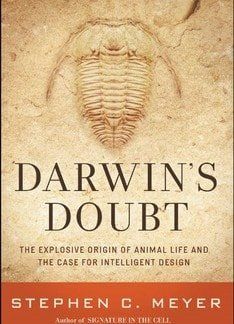Darwin’s doubt: the explosive origin of animal life and the case for Intelligent Design
Stephen C. Meyer
Harper Collins, 498 pages, £8.96 for Kindle edition
ISBN: 978-006207-148-4
Star rating : 4
Meyer has an impressive pedigree in the philosophy of science and geophysics, but is better known as a prominent spokesperson for the ID (Intelligent Design) movement in the USA. Darwin’s doubt is, in many ways, a sequel to his Signature in the cell (2009), both of them impressive in length, scope and incisive analysis.
In both, he explicitly distances ID from biblical creationism, or from the claims that ID is based on religious belief. So is this ‘stealth creationism’, as some of ID’s critics have claimed? That will continue to be debated.
Certainly, it’s pertinent that, having avoided discussing the identity of the ‘IDer’ throughout the book, he belatedly acknowledges that the ‘ability to detect design makes belief in an intelligent designer (or a creator, or God) not only a tenet of faith, but … brings science and faith into real harmony’.
Moreover, ‘evidence of a purposeful design behind life … offers the prospect of significance, wholeness, and hope’ (p. 412). This claims too much for ID, since such human yearnings are only truly satisfied by a personal encounter with the Creator-made-flesh; and faith in Christ invariably comes through the revelation of the Word of God (Romans 10:17).
Nevertheless, that niggle aside, this book is a veritable tour de force in tackling the theory of biological evolution — for example, ‘whether mutation and selection can add new information to pre-existing, information-rich DNA’ (pp.vii–viii) — and showing the superiority of the design argument.
In recent decades, there have been numerous dissenters within the evolutionary scientific community itself. Their collective voice has been getting even louder in the last few years. While their alternative theories are diverse (evo-devo, symbiogenesis, and natural genetic engineering, to name just three), they have in common a profound disagreement with the creative powers claimed for standard neo-Darwinism.
This, of course, is the model of evolution that has been taught in schools and universities for generations and is preached with almost evangelical zeal by the likes of Richard Dawkins.
Many of the doubters are themselves world-class biologists. Indeed, this fact highlights the huge disparity that exists between the ‘Darwinian doubts’ expressed in peer-reviewed scientific literature and the public’s perception that evolution is well established and not seriously in question at all.
In the context of these ongoing debates, Meyer’s major focus is Charles Darwin’s particular doubts about the ‘Cambrian explosion’, ‘the manner in which numbers of species of the same group suddenly appear in the lowest known fossiliferous rocks’ (On the origin of species).
He shows that evolutionists since Darwin have singularly failed to explain where the explosion of novel animal forms came from or what mechanisms (within their paradigm) might have been responsible.
Dealing in turn with the ideas of major evolutionist dissenters, he also finds these wanting. Whichever of the ‘three pillars’ of neo-Darwinism have been challenged (variation, natural selection or heritability), the naturalistic scientists have reached an impasse.
Science is no closer to explaining the origin of the complex, digitally-coded information systems in DNA. Rather, as genomics discoveries are made apace, theories of blind, undirected evolution appear ever more audacious.
In mid-December, yet another stunning discovery was reported: a hitherto unknown genetic code which controls genes rather than being involved in protein manufacture — the rub is that this code is written on top of the existing DNA code!
In other words, it now appears that many of the 3-letter codons have a dual function — so have been appropriately dubbed ‘duons’ — another nail in the coffin of neo-Darwinian evolution — and certainly something Meyer would have included in Darwin’s doubt but for its recency.
Philip Bell
Creation Ministries International





